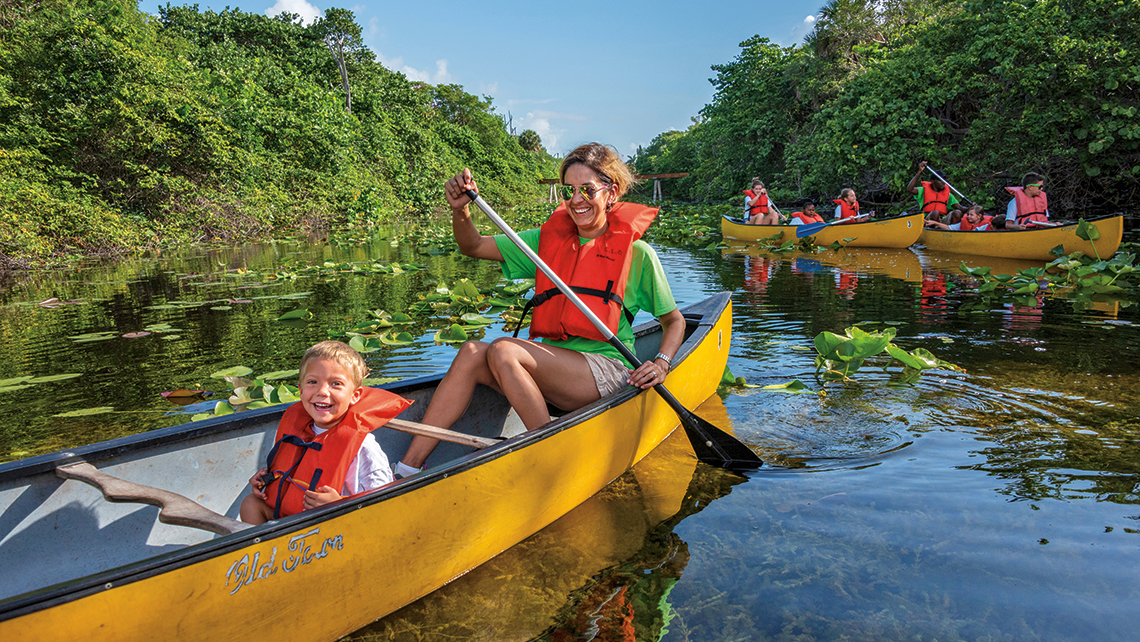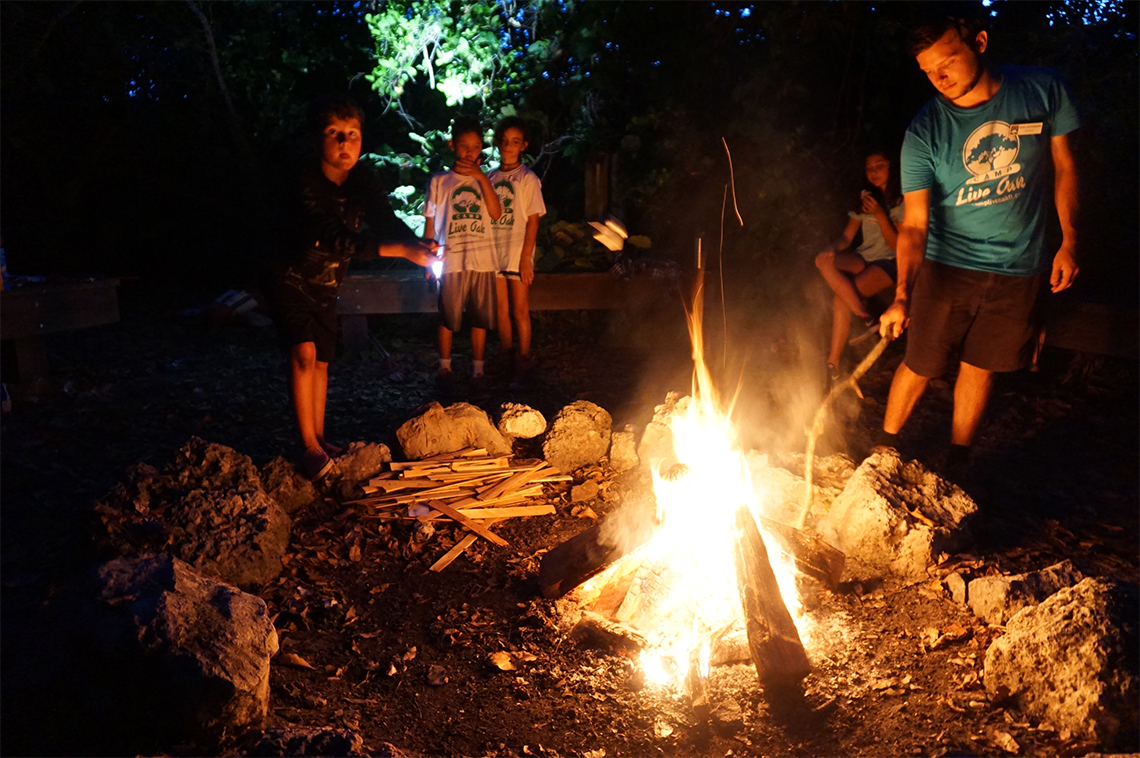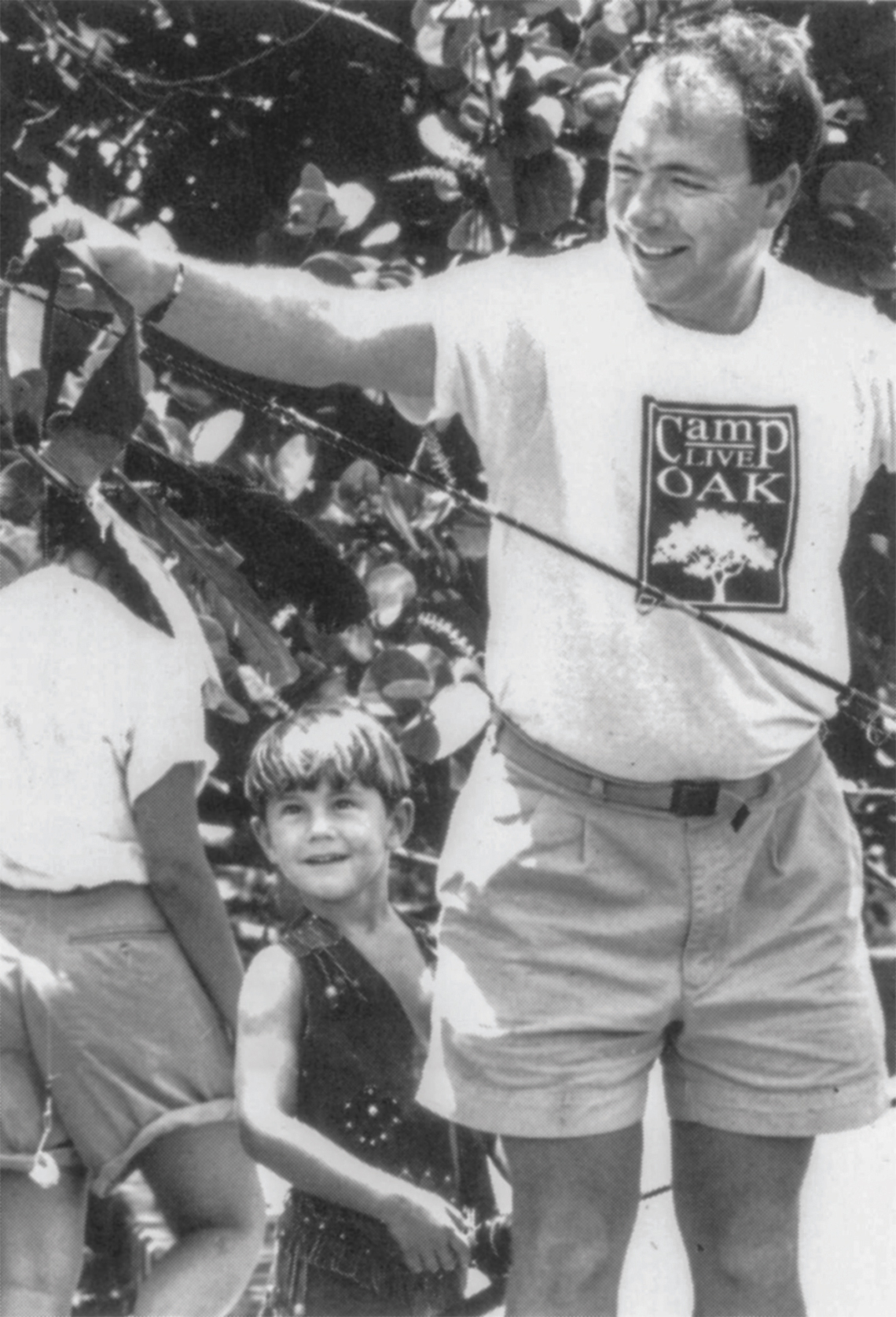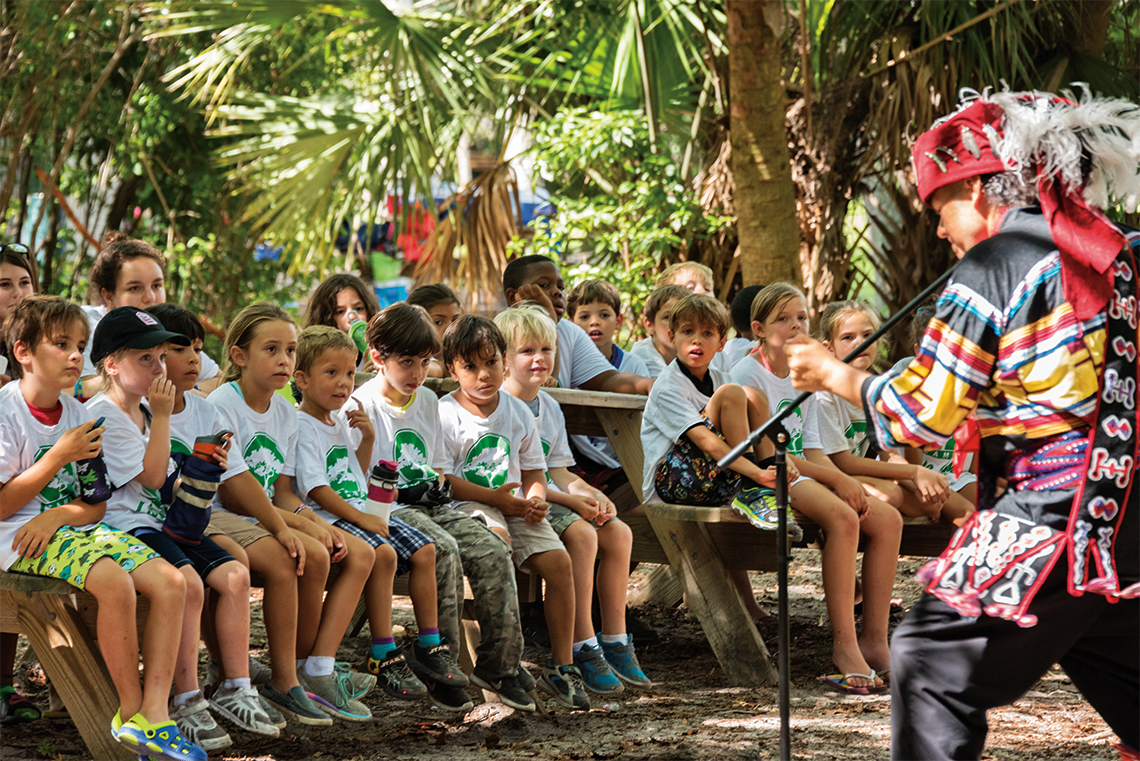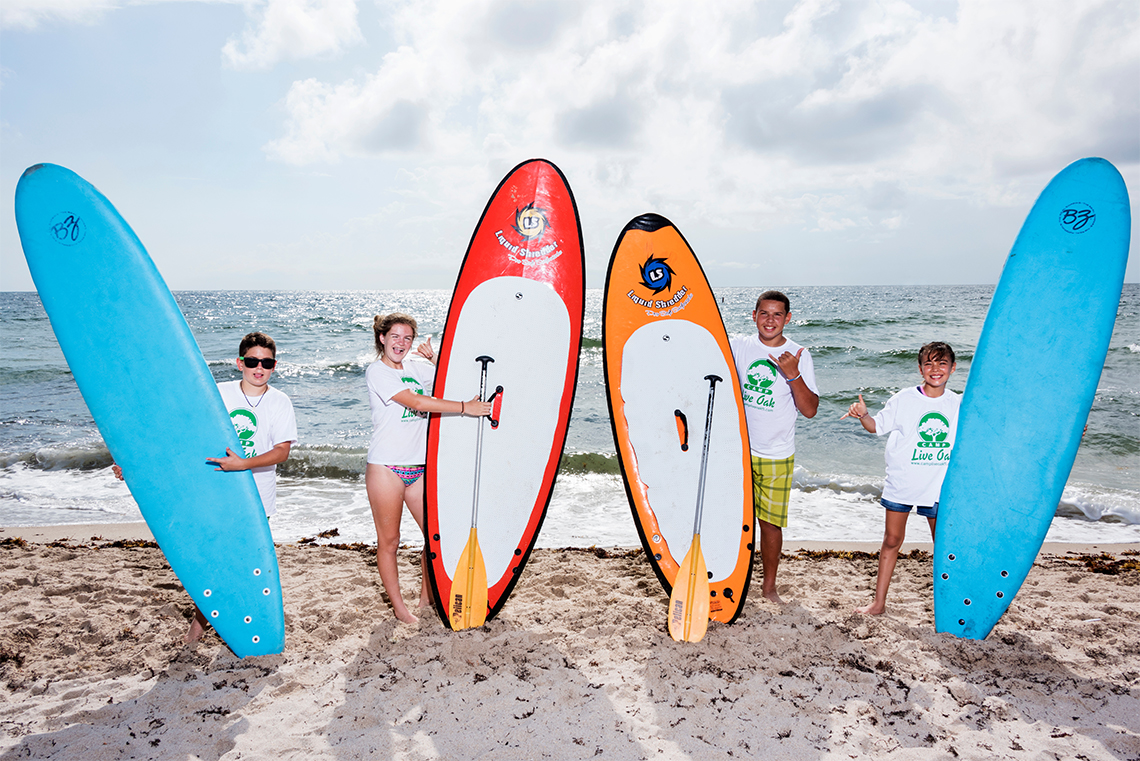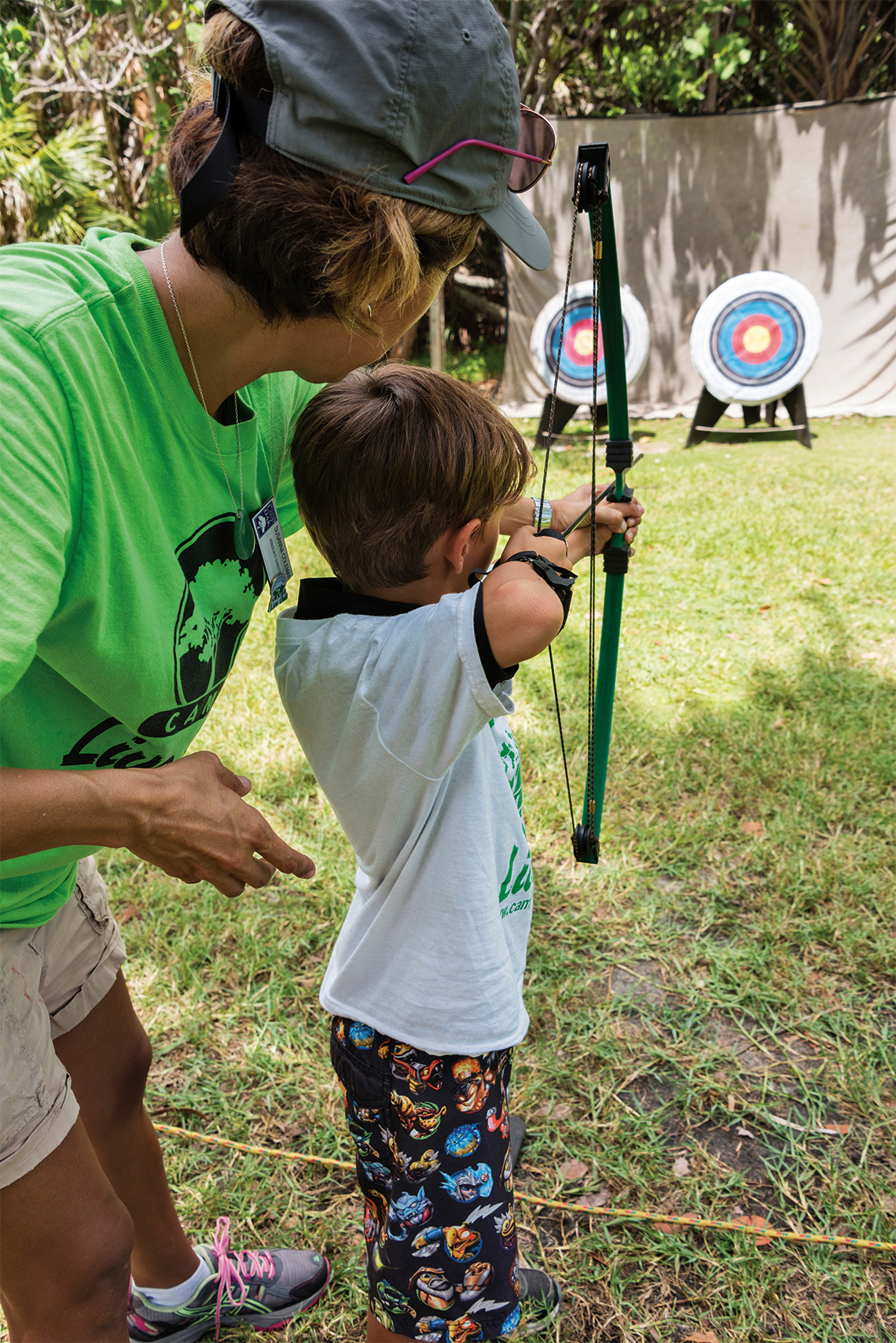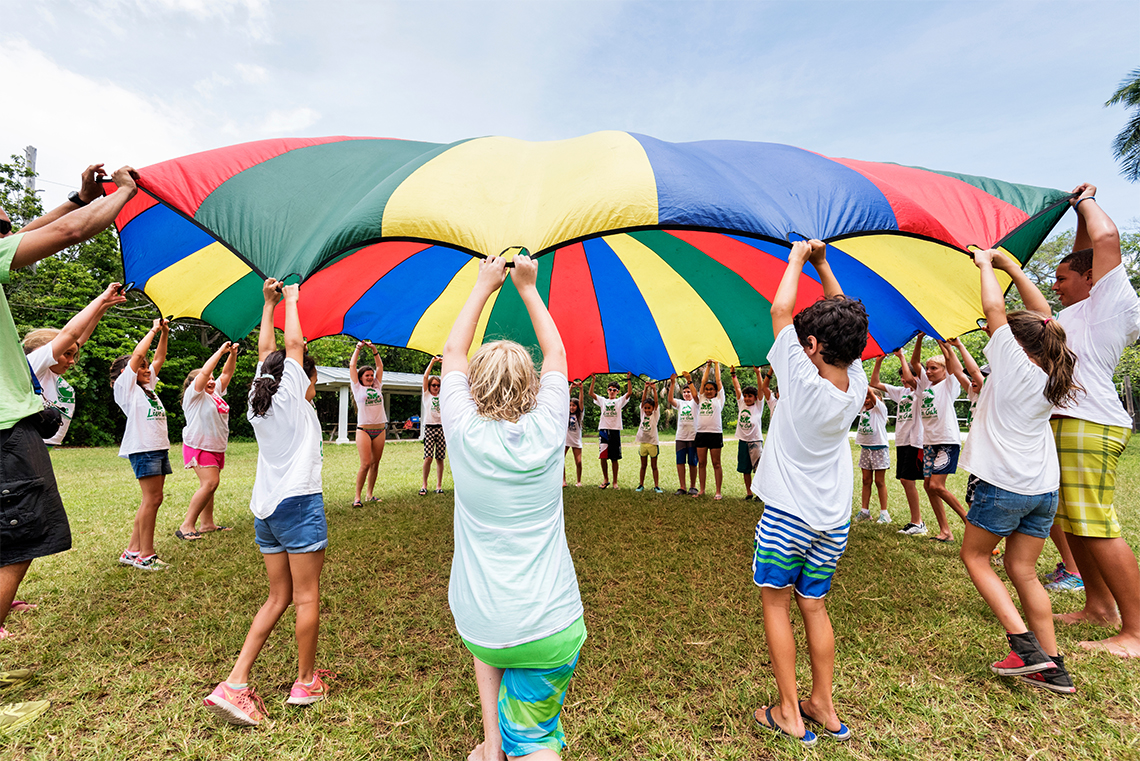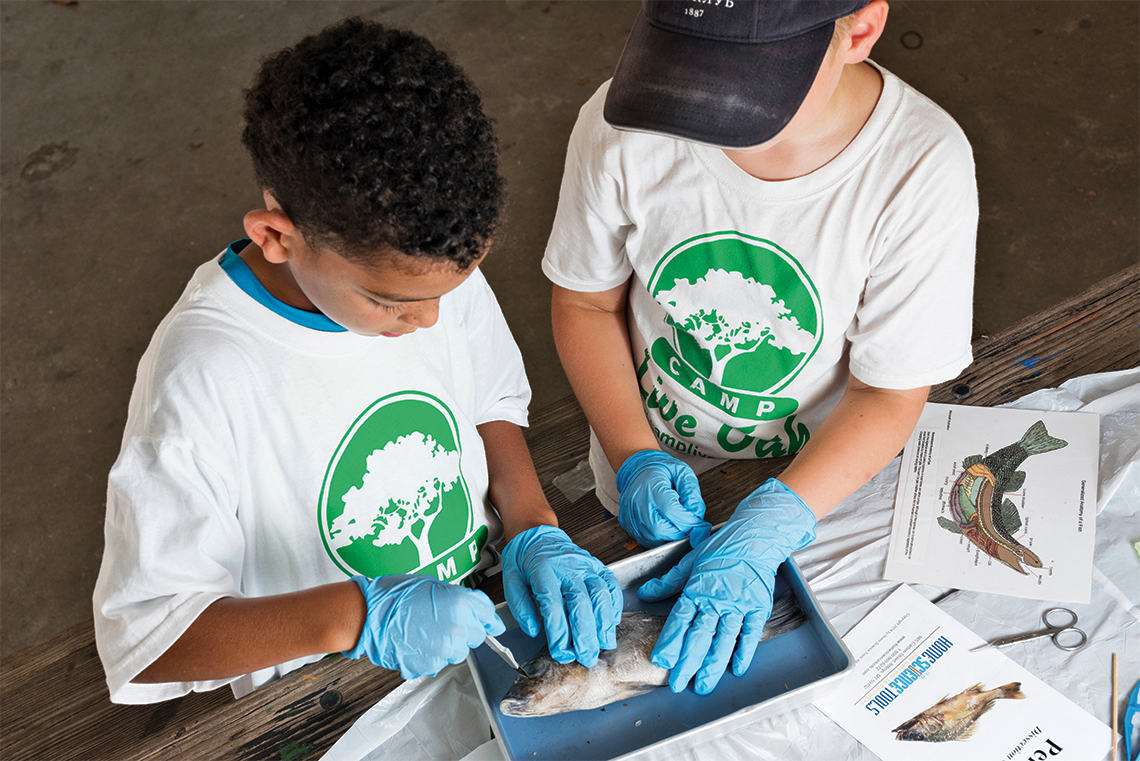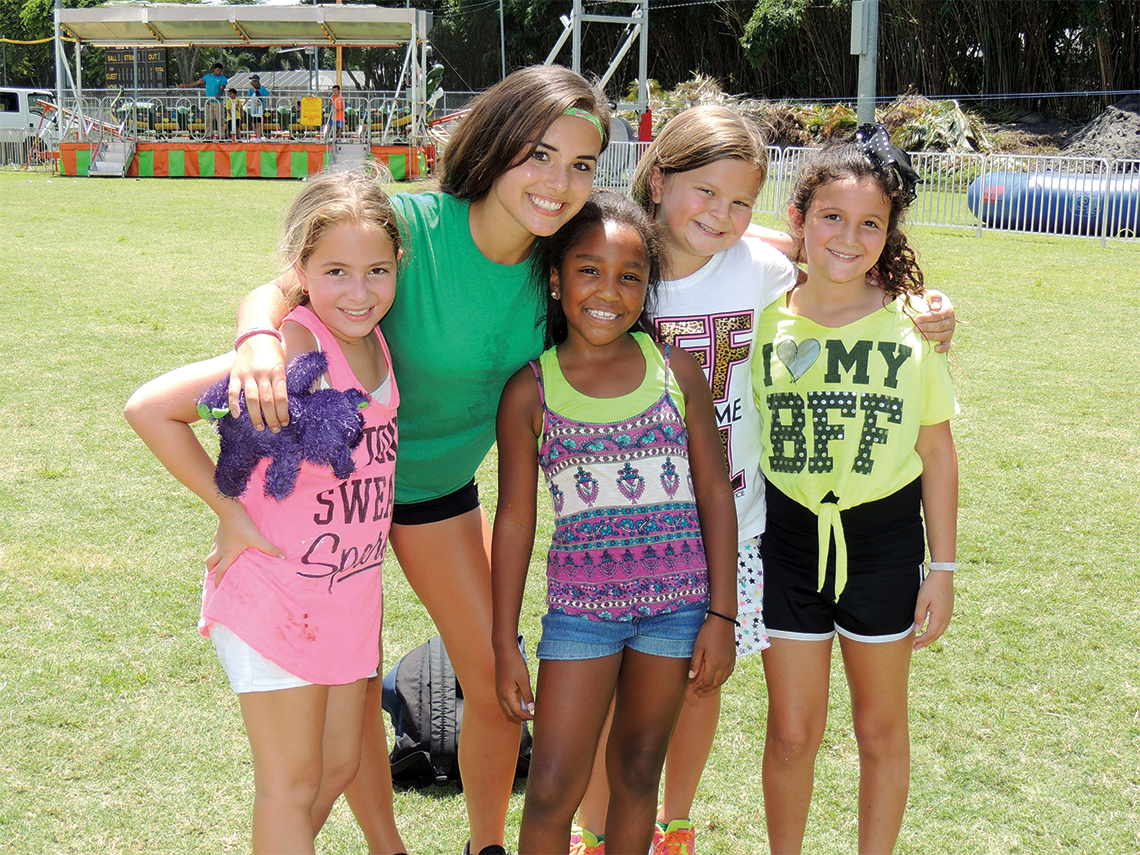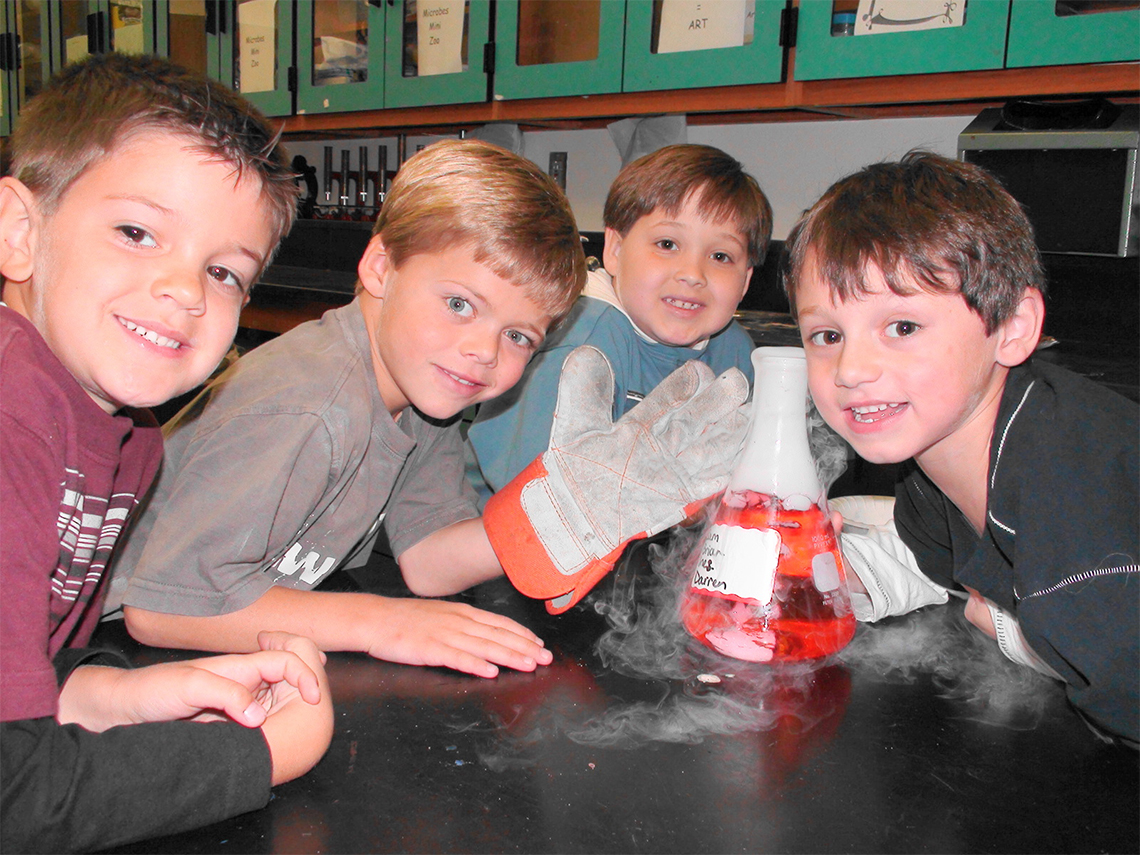Lunchtime arrives at Camp Live Oak and with it, shade and water. A group of about a dozen campers and a handful of counselors jog over from the open clearing where they’ve been playing Capture the Flag, the longtime summer camp favorite that looks like a healthy mixture of flag football and Lord of the Flies chaos. The kids arrive at the pavilion where backpacks and lunchboxes are piled up, and they dig in. Over peanut butter sandwiches and juice boxes, they compare notes on the morning.
Six-year-old Avery Myers would like you to know that she found an angel. Carefully, she pulls it out of her bag.
Now, to dull adult eyes and an uncreative adult brain, Avery’s angel might look like a scuffed, plastic Christmas tree ornament that’s seen better days. That would be incorrect.
“It was in a treasure chest,” she says between bites of peanut butter sandwich. “From a real pirate.”
Nearby, Ken Evans smiles. As activities go, the treasure hunt is one of the staples of Camp Live Oak, the summer and holiday camp he founded at Hugh Taylor Birch State Park 30 years ago. Kids get in a canoe, row to a secret island and – would you believe it! – discover a treasure chest that’s been left there, presumably by a real pirate because who else would go around Birch State Park leaving treasure chests. The younger kids scramble for treasures that they’re allowed to keep and show off as proof of their adventuring.
For older campers, something like the interesting and perhaps terrifying facts of science might hold more sway. David Vargas, 11, has been coming to Camp Live Oak for seven years. He likes the sports and the nature hikes; on the latter, he pays attention.
“We learn about the trees and animals around here,” he says. “Like the spiders. I’ve learned that the females are bigger than the males – they’re huge.”
Whether it’s young kids showing off treasure or older kids showing off knowledge, this is what Evans likes to hear. He directs the camp that he founded 30 years ago. Over the years, Evans’ jobs at the camp have involved just about everything – the paperwork that goes with getting a camp fully accredited, dealing with parents nervous about sending their little ones into the wilds of Birch, organizing herds of teen and twentysomething counselors, even – and don’t tell the younger campers this – even a bit of low-level pirate work.
Now the camp and Fort Lauderdale institution is 30 and Evans is 63. He knows the camp won’t be his forever, which is why his big project now is turning it into a registered not-for-profit organization. That, he believes, is the next step in preserving a camp that spans two locations and programs ranging from traditional summer camp to sea science and conservation to scuba diving.
Today, the camp is big, established and a long way from the camp Evans had when he started.
In 1987, Ken Evans worked at what was then called Nova University. For fun, he rollerskated in Birch State Park.
It wasn’t a great time for Birch. Park attendance was down and the state was in court fighting Antioch College, Hugh Taylor Birch’s alma mater and the place that he left his land to if it could be proved that the State of Florida had neglected it as a natural refuge.
The state eventually won the court case, but low attendance and other related problems were still there. One day, Evans was walking through the park with its then-director, whom he had gotten to know through his rollerskating outings. They discussed a summer camp, and whether Evans might like to run it. As Evans remembers it, he asked what they’d call the camp – just as the pair were walking past a huge live oak.
In the first year, the camp was small and often organized on the fly. Evans got used to fielding calls and dealing with parents. At one point a mother called him up to ask about venomous snakes in the park. He assured her that campers were entirely safe. Later that summer, reports made the news of a 60-foot boa constructor being pulled out from under a building on park property. The mother called again. (It should be noted that, while perhaps not the thing you want to have living under a building, a boa is not venomous.)
In the following years and decades, the camp grew in both camper numbers and programs offered. But Evans always stuck to a few core principles.
“I believe every child is gifted,” he says, “so all the science is high-end science.”
Creative play and imagination – activities like the treasure hunt – always play a role. “Developmentally, it’s using a different part of the brain,” he says. For older kids, mechanics and tinkering, and working with your hands makes up part of the program. Teenagers are taught sewing, and taking apart and putting back together old mechanical devices is always good fun. (Old VCRs lying around can be put to this use at the camp.)
There are elements of sports, elements of music and creative arts, elements of more bookish learning. Groups of campers compete for awards, and every kid’s a winner. That’s not necessarily in a participation-trophy way – every kid’s good at something, and the camp doesn’t focus on just one element.
There’s also an underlying ethos of kindness. Years ago, Evans discovered a book titled Teaching Your Children Values that promotes a secular, inclusive approach towards universal values. Evans is a believer in the Montessori method of individual, child-led learning – but he also believes in creating community. A community for all. Sometimes over the years, counselors have come in with a kid who’s misbehaving and might need to be removed.
“I say no, he’s the one we have to work with and make him better,” Evans says.
If some values are universal, other details have changed. In the past, Evans says, camps like Live Oak got campers for the whole summer; working parents would sign kids up for sessions that began the week school let out and continued right up until the start of the next school year. In that scenario, he says, the first week would be spent getting to know the kids – their strengths, their personalities – and then building on that throughout the summer.
Now, with more specialization and a buffet of academic camps, arts camps, sports camps and more, it’s become more common for camps like Live Oak to only get kids for a week or two at a time.
Then there are the things they now bring. On the first day, Evans says, kids are told they can’t have cell phones on them. They may bring them, but they have to keep them in a bag, and they have to ask permission to use them for an emergency. Kids, Evans says, seem not quite sure what to do at first. After the second day, he says, they start being able to pretend again.
While there’s been an evolution in the programs offered and even the locations – the camp also offers programs at eastern Broward’s other big state park, Dr. Von D. Mizell/Eula Johnson State Park – there’s also that continuity. It’s modern, but it’s also a traditional summer camp.
Anna Hayden was a camper through elementary and middle school, then went on to be a counselor while a student at Fort Lauderdale High School. Now in her 20s, she remembers things like the spooky stories and legends the counselors would tell.
“It’s just so fun,” she says. “I loved camp when I was younger and I love sharing the stories that I heard when I was a kid.”
Most counselors had experiences as campers, and something brings them all back. Cameron Givens, a St. Thomas Aquinas graduate who will study and play football at Florida Atlantic in the fall, says there’s just something about getting outdoors and into nature. “It’s just the atmosphere,” he says.
On this day, the atmosphere is warm and a bit sticky. Lunch is ending and soon, there’ll be a lesson. Three rangers from the park have turned up and, in the next pavilion over, are setting up a lesson about the Calusa Indians and the things they hunted and used. Tables full of seashells, turtle shells and rabbit skins will be used to piece together the lives of the first Floridians.
First though, lunch has to be dealt with.
“Make sure all your lunches are closed tightly so the raccoons don’t get them,” Evans says. The raccoons are invoked frequently.
“I see shoes over there; whose shoes are those? The raccoons are going to walk away with those if you don’t put them away.”
At some point in the not-too-distant future, this will be someone else’s job. Ken Evans, who now gives some children the same raccoon warnings he once gave their parents, will not be here forever.
But for now, one child has a stomach ache and another child is wearing one shoe. Evans smiles, suggests a drink of water, and asks who that shoe over there belongs to. For now, there’s still work to be done.
Happy Campers
Put off signing the kids up for summer camp? Relax, plenty of great options are still available. Here are just a few of our favorites.
American Heritage Camps
What: Whatever the child’s interest is, basically. American Heritage School offers a general day camp that includes outdoor games, field trips, art, computers, games and more. Specialized camps include theater, science, art, robotics, video production and sports including soccer, tennis and lacrosse. ahsummerprograms.com
Museum of Discovery and Science
What: Hands-on science fun. There’s a different theme every week. Themes include “The Science of Food,” “All About Animals,” “Under the Sea,” “Prehistoric Party” and more. mods.org/programs/summer-camps
St.Mark’s Camps
What: A variety of activities. The Episcopal K-8 school offers a general day camp with diverse activities as well as specialized camps for musical theater or engineering and sports including flag football, volleyball, basketball and soccer. Combination camps are also available. saintmarks.com/academics/summer-program
Broward Center for the Performing Arts Summer Theater Camp
What: Theater camp at Fort Lauderdale’s biggest stage. This camp’s for everybody from young kids who’ve never acted before to teenagers who want to turn professional. Each session is a full month, and there’s a live show at the Amaturo Theater at the end. browardcenter.org/summer-theater-camp
FAT Village Center for the Arts
What: Painting and drawing. Fort Lauderdale’s burgeoning arts district is mostly known for its monthly art walks, but it’s a busy community with things happening every day – and in the summer, that includes campers. Kids from elementary to high school age are welcome for arts classes taught by professional artists. fatvillagecenterforthearts.com
Funky Fish Ocean Camp
What: Everything saltwater. Kids learn ocean sports including snorkeling and boogie boarding. There’s also ocean-themed arts and crafts, and the week typically finishes up with a glass-bottom boat ride. funkyfishkidsday.com
Camp Live Oak, Broward’s only American Camp Association-accredited summer camp, offers camps throughout the summer at Hugh Taylor Birch State Park and Dr. Von Mizell/Eula Johnson State Park. For rates and a full list of activities, visit campliveoakfl.com.


